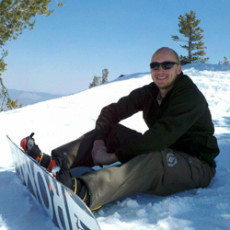Alexander Kemper, 2012 Luis W. Alvarez Fellow
September 30, 2012
As a 2012 Luis W. Alvarez fellow in Computing Sciences, Alexander Kemper will be developing computational theoretical approaches to studying non-equilibrium phenomena and pump-probe experiments.
Originally from the Netherlands, Kemper came to the United States in 1996 to study physics at the University of Florida, in Gainesville. As a graduate student at University of Florida in California, he worked on applying computational approaches to studying high-temperature superconductivity.
After earning his doctorate, Kemper continued working at Stanford as a post-doctoral researcher. "While doing my post-doc, I became interested in non-equilibrium phenomena and realized that it is an ideal place to apply a mix of large-scale computing and theoretical physics," he says.
Kemper notes that his interest in computing began at age four. "I was always interested in programming and getting computers to solve puzzles. I actually started out as a computer engineering major in undergrad, but changed midway through to physics," he says. "During grad school I was recruited by my PhD advisor, who does research using density functional theory, and I have been in the computational physics field ever since."
Kemper moved to the Bay Area in 2010 and enjoys all outdoor activities in his spare time, including hiking, rafting, kayaking, canoeing, snowboarding and playing rugby. When he's not outdoors, Kemper likes to cook, or play video and board games.
About Computing Sciences at Berkeley Lab
High performance computing plays a critical role in scientific discovery. Researchers increasingly rely on advances in computer science, mathematics, computational science, data science, and large-scale computing and networking to increase our understanding of ourselves, our planet, and our universe. Berkeley Lab’s Computing Sciences Area researches, develops, and deploys new foundations, tools, and technologies to meet these needs and to advance research across a broad range of scientific disciplines.







 Instagram
Instagram YouTube
YouTube